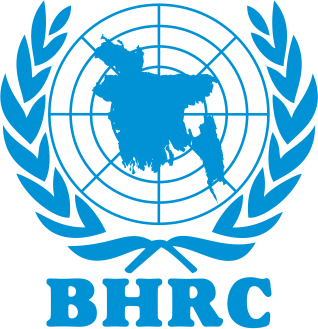

|
EDITOR
|
Editorial
‘Fortnightly’
পাক্ষিক |
|
|
BHRC Human Rights Report January
to June 2015
Official killing 1338
and
total killing 2898
Human Rights Report:
The documentation section of
Bangladesh Human Rights Commission (BHRC) furnished
this human rights survey report on the basis of
daily newspapers and information received from its
district, sub-district and municipal branches. As
per survey it appears that official killing 1338 and
total killing 2898 peoples were killed in January to
June, 2015 in all over the country. It proves that
the law and order situation is not satisfactory.
Bangladesh Human Rights Commissions extremely
anxious about this situation. In the month of
January to June, 2015 average over 16 people were
killed in each day.
The Law enforcing agencies and related Govt.
departments should be more responsible so that
percentage of killing may be brought down to zero
level. To institutionalize the democracy and to
build human rights based society the rule of law and
order must be established everywhere. Through
enforcing rule of law only such violation against
human rights can be minimized.
It appears from documentation division of BHRC:
Total official 1338 killed in January to June, 2015
Killing for dowry 47, killing by family violence
257, Killed due to social discrepancy 244, Political
killing 185, Killed by Law enforcing authority 55,
Killed due to BSF 26, Killed due to doctor
negligence 47, Assassination 69, Mysterious death
350, Killed after rape 28, Journalist kill 02,
Abduction kill 28.
Killed by several accidents:
Killed by road accident 1344, Suicide 216
Besides victims of torture:
Rape 102, Sexual Harassment 18, Torture for Dowry
17, Acid throwing 09
Dawn of a new era
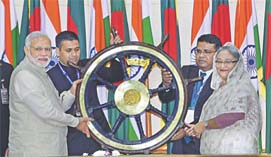
Human Rights Report:
Bangladesh and India on 8 June 2015 opened a new
chapter of hopes in their relations, fraught with
dubious politics, myopic diplomacy and tardy
bureaucracy over the decades.
When Indian Prime Minister Narendra Modi was leaving
Delhi for Dhaka in the morning, he twitted a
message, saying this visit would strengthen the bond
between the two nations and benefit people of the
two countries as well as of the region.
Bangladesh PM Sheikh Hasina didn't hesitate to
reciprocate. She broke the protocol to welcome her
counterpart at the Hazrat Shahjalal International
Airport.
Hasina's gesture was not lost on Modi, who responded
by twitting: "Thank you PM Sheikh Hasina for the
warm welcome."
Modi chirped again: "Hello Bangladesh. I bring with
me the affection & goodwill of the people of India."
Thus the morning began yesterday, setting up the
stage for signing 22 deals to boost economic growth,
connectivity and security cooperation.
Top leaders of the two countries translated their
goodwill in actions by signing a host of treaties
and agreements to pave the way for regional
connectivity, economic development and increasing
people to people contact.
"Connectivity by road, rail, rivers, sea,
transmission lines, petroleum pipelines and digital
links will increase. Today, we have unveiled some of
the pathways to this future," Modi said at a joint
press briefing after the signing of the deals.
"We launched two bus services that will connect our
citizens more easily and our two nations more
closely," he said in a statement.
At the briefing, Hasina said, "We understand each
other's concerns and priorities. Prime Minister Modi
and I agree that a greater connectivity is vital for
the development of the two countries and the
region."
She mentioned that connectivity across the region
would reduce inequality and maximise welfare gains.
With the ratification of the Land Boundary
Agreement, the official procedure was completed for
swapping territories and people between the two
countries around 41 years after the 1974 Indira
Gandhi-Sheikh Mujibur Rahman historic pact.
In his speech, Modi also addressed Bangladesh's
longstanding concern over sharing of the Teesta
water.
At the initial stage of his plan for Dhaka visit, it
was expected that Teesta water-sharing deal would be
inked during the visit. But a couple of days before
his visit, the Indian side announced that the deal
would not be signed this time.
Unwillingness of West Bengal Chief Minister Mamata
Banerjee stood as an obstacle to signing the deal.
This showed there was no lack of sincerity on Modi's
part.
Yesterday, he assured Dhaka of the water-sharing
deal. "I am confident that with the support of state
governments In India, we can reach a fair solution
on Teesta and Feni Rivers."
He clearly stated the importance of resolving the
problem. "Our rivers should nurture our
relationship, not become a source of discord. Water
sharing is, above all, a human issue. It affects
life and livelihood on both sides of the border."
As the Indian leader spoke for shared prosperity of
the neighbours, he announced quick implementation of
the line credit of $800 million and full
disbursement of $200 million in grants as "a tribute
to our cooperation".
Modi announced extending another line of credit of
$2 billion for infrastructure and other development
activities in Bangladesh.
He also touched upon the issue of Bangladesh's trade
deficit of $5.5 billion with India, and assured
Hasina that he would do everything to bridge the
deficit.
Modi's words "the future I dream for India is the
future I wish for Bangladesh" also reflected the
reality how India needs a strong and developed
Bangladesh for its own interests because of
Bangladesh's geographical position.
Earlier, the two sides approved 22 deals, giving a
clear indication that they want to strengthen
bilateral cooperation and integrate economic
activities through rail, road and waterways
connectivity.
Democracy 'absent' in Bangladesh
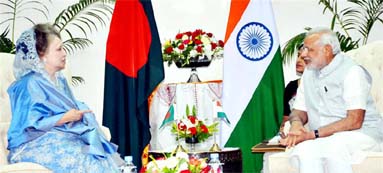
Human Rights
Report:
BNP chairperson Khaleda Zia yesterday told Indian
prime minister Narendra Modi that 'democracy is
absent in Bangladesh' and stressed the need to
restore multi-party democracy to usher in
sustainable development in the country and the Saarc
region. The BNP delegation, led by Khaleda,
discussed different socio-economic and political
issues during the meeting with Modi at Hotel
Sonargaon. After the meeting, Khaleda told foreign
journalists that it was 'fruitful'. The motorcade of
the former premier reached Hotel Sonargaon at
3:45pm, shortly after Raushan Ershad, leader of the
opposition, left the hotel. BNP standing committee
members Tariqul Islam, Nazrul Islam and Abdul Moin
Khan, besides BNP chairperson's advisers Reaz Rahman
and Sabihuddin, were present during the
45-minute-long meeting that began at 3:50pm. Khaleda
presented the Indian prime minister a dhoti and a
saree for his mother. Meanwhile, briefing reporters,
BNP standing committee member Dr Abdul Moin Khan
said they have put importance on restoration of
multiparty democracy, terming it the most important
factor for overall development of the country.
"It is important to note that democracy is absent in
Bangladesh. Not only in Bangladesh, it may lead to
instability in the region," he added. The BNP leader
said, "Since we live in a global village, it is not
possible for anyone to live in peace assuming that
nobody would create problems." He added that in the
absence of democracy, the government's repression on
thousands of opposition leaders and activists,
including party acting secretary general Mirza
Alamgir Kabir, also came up in the discussion.
"We held discussions over the current situation of
the country. Democracy is absent in Bangladesh at
present and there is no rule of law in the country
as well. All institutions work as per the
government's wish, and thousands of opposition
leaders and activists from the top to grassroots
level have been facing repression and harassment,"
he said. "We also told the Indian prime minister
that people want to elect their representatives
through a fair election and they want to get back
their voting rights," he added. Moin Khan said they
discussed a host of bilateral issues, including
development programme for youth, women, child and
economic situation. "We have said real development
can only be ensured by guaranteeing freedom of
expression and accountability," he added. When asked
about Modi's reply, Moin Khan said, "It is their
part to disclose what Modi said during the meeting."
Sources said that Khaleda had handed over her
party's policy papers to Modi, detailing its stand
on democracy and the overall situation in the
country. Indian foreign secretary Subrahmanyam
Jaishankar and Indian high commissioner Pankaj
Sharan were also present at the meeting.
US welcomes Indo-Bangla
deals
Human Rights Report:
The US deputy assistant secretary for
South and Central Asia has welcomed the agreements
signed between Bangladesh and India during Prime
Minister Narendra Modi's visit to Dhaka.
"We look very positively of all agreements signed
between India and Bangladesh," Eileen O'Connor said
to a question at a media engagement with a select
group of diplomatic correspondents in Dhaka on 8
June.
This was the first comment from a US official after
Modi ended his whirlwind two-day trip the day
before.
Trade and connectivity dominated a series of deals
signed between the nations, while the process was
kick-started to settle 41-year-old land boundary
issue.
The US keenly observed the visit since it has deep
engagements both with India and Bangladesh as part
of its foreign policy shift towards Asia.
"We share the enthusiasm with Bangladesh for greater
cooperation in trade and commerce and greater
exchanges of people and ideas," the deputy assistant
secretary said.
O'Connor arrived in Dhaka on Sunday on a three-day
visit ahead of a regional conference on
counter-terrorism going to be held in Astana on June
29-30.
How government and civil society can work together
for countering violent extremism is her focus during
the visit.
She is here after a White House summit on violent
extremism where Foreign Minister Abul Hassan Mahmood
Ali represented Bangladesh.
The US official appreciated Bangladesh's position of
zero tolerance for any form of violent extremism.
O'Connor will also speak at a roundtable on "sexual
harassment, gender-based violence and the role of
media" on Tuesday.
But journalists asked her about Modi's visit since
she was a deputy assistant secretary for this
region.
She appreciated the connectivity deals and said, "We
have been promoting a much more integrated region
throughout South Asia and Central Asia because as
you know, US has made a shift towards Asia."
"And because we see an Asian country like Bangladesh
which has 6 percent annual growth as a model for
economic growth that the entire region can subscribe
to."
The deputy assistant secretary said for the US, the
"greater connectivity" in any form was better for a
country to develop.
It also helps a region to be stable with more
prosperity, education and jobs, according to her.
Asked whether the US felt "threatened by the
deepening relations between India and Bangladesh and
whether Washington saw Bangladesh through the eyes
of India, O'Connor said: "Absolutely not."
"We do not see Bangladesh through the eyes of
anyone, but through the eyes of US. And for us, the
relation between India and Bangladesh is a positive
one, and the relation is a positive development".
She said the US and India had a "very vibrant" and
"cooperative" relations on all fronts like "what we
do with Bangladesh".
The greater cooperation helped to foster "trust",
and more dialogue between the countries in the
region meant "more stable and more economically
prosperous" those countries were, the deputy
assistant secretary explained.
.
Lt Gen Abu Belal
Mohammad Shafiul Huq new army chief
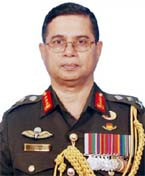
Human Rights Report:
Armed Forces
Division's Principal Staff Officer (PSO) Lt Gen Abu
Belal Mohammad Shafiul Huq will be replacing General
Iqbal Karim Bhuiyan at the helm of the force that
has earned a name for itself in global peacekeeping.
Gen Huq will take charge as a general on June 25,
Directorate of Inter Services Public Relations (ISPR)
Director Shaheenul Islam told bdnews24.com.
Born in 1958, Huq joined the Bangladesh Army in
1978. He has been serving as the PSO since 2013.
His brother Annisul Huq was elected Mayor of Dhaka
North City Corporation in April.
Father to two, Shafiul Huq was awarded the 'Sword of
Honour' for his outstanding performance in the
Military Academy as a young cadet.
Huq completed Bachelor of Arts from Dhaka University
and did his Master's in Defence Studies from the
National University.
He also has a Master of Arts degree in Philosophy
from Bangladesh University of Professionals (BUP)
and is currently pursuing a doctorate degree on
regional connectivity from the same organisation.
Lt Gen Huq's military education includes a variety
of training courses, both at home and abroad on
strategic studies, tactics, military science, and
weapon systems.
He is a graduate at the Defence Services Command and
Staff College, Mirpur, Bangladesh and also at the
Command and General Staff College, Fort Leavanworth,
Kansas, USA.
He attended National Defence Course and Capstone
Course at NDC, Bangladesh.
Gen Huq took part in the UN peacekeeping missions as
an observer in UNIIMOG (Iraq) and Deputy Force
Commander of UNMEE (Ethiopia and Eritrea).
He served as the ADC to the President, Brigade Major
of an Infantry Brigade and Chief of Staff of an
Infantry Division.
He was also an Instructor at Bangladesh Military
Academy and Chief Instructor at Defence Services
Command and Staff College, Mirpur.
He commanded two Armour Units, three Brigades (One
Armour and two Infantry) and two Divisions, and
served as Military Secretary and Adjutant General of
Bangladesh Army.
Taj Mahal ranked 3rd among world's top landmarks
Human
Rights Report:
According to TripAdvisor's 2015 Travellers Choice
Attractions Awards, Taj Mahal was ranked third in
the list of top landmarks. The top two places were
taken by Machu Picchu in Peru and Angkor Wat in
Cambodia respectively.
"The Travellers' Choice Landmarks highlight some of
the world's most iconic, must-see attractions that
have won over the TripAdvisor community," said
Barbara Messing, chief marketing officer for
TripAdvisor.
Built by Mughal emperor Shah Jahan in memory of his
late wife Mumtaz Mahal, the white marble mausoleum
in Agra is also a symbol of enduring love.
In 1983, it became a UNESCO World Heritage Site. The
Taj Mahal attracts 2-4 million visitors annually,
with more than 200,000 from overseas.
The Tower of London was named as the best rated
landmark in the UK with Edinburgh Castle in Scotland
in second place.
"The UK is blessed with a lot of fantastic
landmarks, but especially in the summer they can
prove very popular, so it often pays to plan ahead
and book a tour in advance," said a TripAdvisor
spokesperson.
Gordon Innes, CEO London & Partners, the Mayor of
London's official promotional company for London
attributed the Tower's popularity last year to the
"spectacular poppy installation" in memory of the
war heroes of World War One, with more than five
million attending the stunning display.
"It's no surprise that this world-famous landmark,
along with six other iconic London attractions, have
been deservedly championed by the TripAdvisor
community," he said.
However, none of the UK landmarks made it to the
global top 10.
The list is based on the millions of reviews and
opinions from TripAdvisor travellers and the?winners
are determined using an algorithm.
Though ambitious,
budget achievable: Muhith
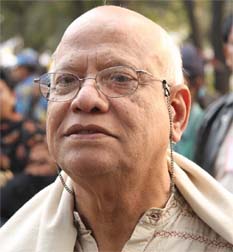
Human Rights Report:
Observing that the budget is
achievable though ambitious, Finance Minister AMA
Muhith on Monday reiterated that income tax,
corporate tax and value added tax (VAT) will be a
major source of revenue in the next fiscal year.
'One of the major changes of this year's budget is
income tax. Income tax will be the highest source of
income in terms of revenue collection….tax is highly
progressive and we'll focus mainly on income tax and
corporate tax… another important source is value
added tax,' he said.
The Finance Minister was discussing with high
officials of the National Board of Revenue (NBR),
including its Chairman Md Nojibur Rahman, the way of
implementing the budget and meeting the revenue
target at the NBR office in Dhaka.
Muhith voiced his conviction that the NBR is very
much capable of achieving the revenue target to
implement the budget as its manpower along with
their efficiency has been increased.
He said they will try to achieve a 30 per cent
revenue collection by the current year, saying: 'If
we can do this, it'll be easier to achieve our
target.'
The Finance Minister also said relief has been
provided for the income tax payers in the upcoming
budget. 'Nothing has been changed to the income tax;
rather more relief has been provided.'
Talking about his visit to the NBR, Muhith said he
is there to work out a plan as to who will be the
possible target of NBR. 'There're lots of rich
people at upazila level who are eligible for paying
tax. Plan your job.'
About corruption, Muhith said he would not refuse
that there is no corruption in the NBR or other
offices under his ministry. 'But the scenario has
changed now. Once people used to get scared seeing
tax collectors, but there has been a massive change
now as accountably, transparency and professionalism
have been established.'
Bangladesh working hard to strengthen democracy: PM
Human Rights Report:
Prime Minister Sheikh Hasina has said Bangladesh is
following Westminster democracy and has been working
hard to strengthen its all democratic institutions,
reports UNB from London.
"Though we've been trying to follow Westminster type
of democracy, it's a difficult job. Anyway, we're
improving gradually to this end," she said.
The Prime Minister was addressing a reception at the
office of the Commonwealth Parliamentary Association
(CPA), UK Chapter, at British Parliament on Monday.
Chairman of All Party Parliamentary Group on
Bangladesh Keith Vaz accorded the reception to the
lawmakers who were elected for the first time to the
British Parliament.
Sheikh Hasina said her vision is to build a
Bangladesh which will be free from poverty where the
key factors will be democracy and secularism.
Thirty British MPs, including Rushana Ali, Dr Rupa
Huq, Jimi Fitzpatrick, Anne Main, Kate Osamer,
Catherin West, Jonathon Shaw, Andy Slater, Baroness
Paula Uddin and CPA UK Chapter Chief Executive
Andrew Tuggy were present.
Speaker of the House of Commons John Bercow greeted
the Prime Minister as she alighted from the car.
About secularism, the Prime Minister said the people
of all religious faiths have the freedom to practise
the rituals of their religions and that was
enshrined in Bangladesh constitution.
The Prime Minister recalled with gratitude the
British support for Bangladesh during its tumultuous
birth and also in her fight to establish democracy
in Bangladesh.
She sought more British support to continue
Bangladesh's ongoing development, and said
Bangladesh is making progress in every sector but it
needs more support from Britain as the great country
has long been supporting it.
Terming Britain as Bangladesh's major development
partner, Sheikh Hasina hoped that the two countries
would continue to work together for mutual benefits.
She recollected how the British MPs stood by her
during the 2007-2008 tenure of a caretaker
government which had refused to let her enter
Bangladesh, but she returned home amid international
and local pressure who also forced the government to
hold parliamentary elections.
Turning to Indian Prime Minister Narendra Modi's
recent Bangladesh visit, Sheikh Hasina said she told
her Indian counterpart, "We've a common vision of
rooting out poverty from the region forever."
Responding to the speech of a British parliament
member in which he raised the issue of safety of the
workers in Bangladesh's readymade garment industry,
she said her government always works for the
downtrodden people like workers, farmers and the
common people. And has started taking care how the
workers can get a good atmosphere in their
workplace."
Congratulating the British MPs who were elected for
the first time, the Prime Minister said they are
performing their responsibilities as baroness and
members of parliament. Sheikh Hasina said the people
of Bangladesh struggled for establishing democracy
for a long time. "But you are lucky that you are
enjoying democratic system," she said.
In his welcome address, Keith Vaz praised the Prime
Minister for her courageous work to establish a
strong Bangladesh and that it was a great honour to
have her at the programme.
Tulip Siddique, the new Bangladeshi-origin Labour MP
and niece of the Prime Minister, said she has
learned many things from her aunt Sheikh Hasina and
that helped her be successful in the last polls.
"We're very proud to have the Bangladesh Prime
Minister in the British parliament," she said.
Eat peanuts everyday to slash early
death risk from cancer
Human Rights
Report:
A new study has suggested that peanuts can protect
against early death from cancer and heart disease.
The Maastricht University study found that men and
women who eat at least 10g of nuts or peanuts and
not peanut butter per day have a lower risk of dying
from several major causes of death than people who
do not consume them.
Researchers in the Netherlands said peanuts and tree
nuts both contain various vitamins, fibre,
antioxidants and compounds such as monounsaturated
and polyunsaturated fatty acids that can possibly
contribute to the lower death rates.
They said peanut butter contains salt and trans
fatty acids that could inhibit the protective
effects of peanuts.
Women who ate nuts were also often leaner, had never
smoked and were less likely to report diabetes.
Lead researcher Piet van den Brandt said that a
higher intake was not associated with further
reduction in mortality risk.
Skinny jeans given health warning
Human Rights
Report:
Skinny jeans can seriously damage muscles and
nerves, doctors have said.
A 35-year-old woman had to be cut out of a pair
after her calves ballooned in size, the medics said
in the Journal of Neurology, Neurosurgery and
Psychiatry.
She had spent hours squatting to empty cupboards for
a house move in Australia. By evening, her feet were
numb and she found it hard to walk.
Doctors believe the woman developed a condition
called compartment syndrome, made worse by her
skinny jeans.
Compartment syndrome is a painful and potentially
serious condition caused by bleeding or swelling
within an enclosed bundle of muscles - in this case,
the calves.
The condition caused the woman to trip and fall and,
unable to get up, she then spent several hours lying
on the ground.
On examination at the Royal Adelaide Hospital, her
lower legs were severely swollen.
Although her feet were warm and had enough blood
supplying them, her muscles were weak and she had
lost some feeling.
As the pressure had built in her lower legs, her
muscles and nerves became damaged.
She was put on an intravenous drip and after four
days was able to walk unaided. Other medics have
reported a number of cases where patients have
developed tingly, numb thighs from wearing the
figure-hugging low-cut denim trousers - although the
chance of it happening is still slim for most
people.
41 BD trafficking victims return home
Human Rights
Report:
A batch of 41 Bangladeshi nationals earlier
trafficked into Thailand by sea arrive here on
Wednesday evening, reports UNB.
A flight of Biman Bangladesh airlines -- BG 089 --
carrying them will land at Hazrat Shahjalal
International Airport at 7:30pm, said an official.
Among the returnees, 13 hail from Cox's Bazar, six
from Jhenidah, five each from Narsingdi and
Sirajganj, four from Satkhira, three from Magura,
two each from Jessore and Bandarban, and one from
Faridpur districts.
As a special measure and follow-up to Bangladesh's
commitment made at the Bangkok Meeting on May 29
last, the repatriation of the 41 detained
Bangladeshi nationals are being fully sponsored by
the government of Bangladesh, which includes
airfare, transportation from Suan Plu Immigration
Detention Centre, Bangkok to Suvarnabhumi Airport
and other expenses.
The Bangladesh Embassy in Bangkok with the active
support from the Ministry of Foreign Affairs and
Ministry of Home Affairs of Bangladesh and Ministry
of Foreign Affairs of Thailand and Thai Immigration
Bureau has so far repatriated 919 Bangladeshi
nationals trafficked into Thailand since late 2013.
The Embassy has also repatriated 80 Bangladeshi
nationals since the discovery of mass grave along
the Thailand-Malaysia border on May 1, 2015.
The Embassy under the direct supervision of
Ambassador Saida Muna Tasneem has been working
relentlessly to expedite the return of all the
remaining stranded Bangladeshi nationals in Thailand
at the shortest possible time.
Women Entrepreneurs take the lead
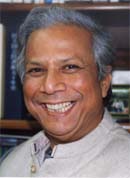
Human Rights
Report:
The 71st Social Business Design Lab organized by
Yunus Centre took place on 16 April 2015 at the
Grameen Bank Bhaban. The half day long program was
chaired by Nobel Laureate Professor Muhammad Yunus,
and brought together more than 130 participations
from Bangladesh and abroad coming from diverse
backgrounds.
Professor Yunus welcomed the participants to the Lab
and updated the audience that 885 social business
projects had been presented in the 70 labs organized
to date since January 2013, of which 860 had been
approved for investment, most of which were already
in operation. He said that we would soon cross the
1000 invested projects mark. At the 71st Lab held
today, six new Nobin Udyokta - new entrepreneurs
from Grameen Bank families - presented their
business plans. Remarkably, four of the six
entrepreneurs presenting today were young women.
The businesses presented were Choa Boutiques by Ms
Mafia Parvin making embroidered and applique
bedspreads and covers ; Taslima Shoes by Md Al Amin
producing fancy footwear; Najnin Handicraft by Ms
Najnin producing creative and colorful beaded, cloth
and a variety of other handicrafts; Shahed Decorator
by Ms Poly Begum; Forhan Cow Fattening Farm by Md
Forhan Firoz Rony and Khuku Mudi Store by Ms Khuku
Rani.Ms Khuku Rani came from Thakurgaon and belongs
to minority community in that region. She began her
business with Tk 2000 and that has grown to Tk
83,000 through her own efforts. Investment from
Grameen's social business fund would add another Tk
1.5 lakhs to her business.
.











